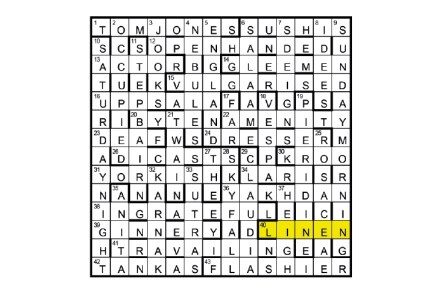to 2397: Obit V
Albert Finney, a fine ACTOR (13), died on 7 February 2019. His legacy includes SATURDAY NIGHT (10) and SUNDAY MORNING (9), and TOM JONES (1), THE DRESSER (27/24) and SKYFALL (28). BYTE (20), FAR (17) and LINEN (40) give an anagram of ALBERT FINNEY. LINEN was to be shaded. First prize Andy Wallace, Coventry Runners-up John Fahy, Thaxted, Essex; Frank Maslen, London W1

















